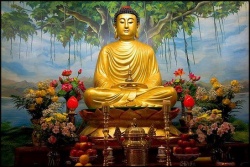Difference between revisions of "Turning of the wheel of the Law"
| Line 1: | Line 1: | ||
[[File:757620 n.jpg|thumb|250px|]] | [[File:757620 n.jpg|thumb|250px|]] | ||
<poem> | <poem> | ||
| − | '''turning of the wheel of the Law''' | + | '''turning of the [[wheel]] of the Law''' |
[転法輪] (Jpn tembo-rin ) | [転法輪] (Jpn tembo-rin ) | ||
| − | The preaching of a Buddha. The "wheel" (Skt chakra ) in this expression derives from that possessed by a wheel-turning king, the symbol of an ideal ruler in Indian mythology. The wheel, or chakra, was employed to symbolize dharma-chakra, or the Buddha's teachings. Just as the wheel-turning king turned his chakra to defeat enemies, the Buddha "turned the wheel" of his teachings to subdue people's illusions and earthly desires. The turning of the wheel of the Law is one of the eight phases of the Buddha's existence—eight successive phases the Buddha is said to have displayed upon descending from the Tushita Heaven into the world. After his attainment of enlightenment, Shakyamuni Buddha gave his first sermon in Deer Park before the five ascetics, with whom he had formerly practiced austerities. On that occasion, he is said to have preached the doctrines of the four noble truths and the eightfold path. This sermon at Deer Park is known as the first turning of the wheel of the Law. See also eight phases of a Buddha's existence. | + | The preaching of a [[Buddha]]. The "[[wheel]]" (Skt [[chakra]] ) in this expression derives from that possessed by a wheel-turning [[king]], the [[symbol]] of an ideal ruler in [[Indian]] [[mythology]]. The [[wheel]], or [[chakra]], was employed to [[symbolize]] dharma-chakra, or the [[Buddha's teachings]]. Just as the wheel-turning [[king]] turned his [[chakra]] to defeat enemies, the [[Buddha]] "turned the [[wheel]]" of his teachings to subdue people's [[illusions]] and [[earthly desires]]. The turning of the [[wheel]] of the Law is one of the eight phases of the [[Buddha's]] existence—eight successive phases the [[Buddha]] is said to have displayed upon descending from the [[Tushita Heaven]] into the [[world]]. After his [[attainment]] of [[enlightenment]], [[Shakyamuni Buddha]] gave his first sermon in [[Deer Park]] before the [[five ascetics]], with whom he had formerly practiced austerities. On that occasion, he is said to have preached the [[doctrines]] of the [[four noble truths]] and the [[eightfold path]]. This sermon at [[Deer Park]] is known as the first turning of the [[wheel]] of the Law. See also eight phases of a [[Buddha's]] [[existence]]. |
</poem> | </poem> | ||
{{R}} | {{R}} | ||
Revision as of 01:44, 4 September 2013
turning of the wheel of the Law
[転法輪] (Jpn tembo-rin )
The preaching of a Buddha. The "wheel" (Skt chakra ) in this expression derives from that possessed by a wheel-turning king, the symbol of an ideal ruler in Indian mythology. The wheel, or chakra, was employed to symbolize dharma-chakra, or the Buddha's teachings. Just as the wheel-turning king turned his chakra to defeat enemies, the Buddha "turned the wheel" of his teachings to subdue people's illusions and earthly desires. The turning of the wheel of the Law is one of the eight phases of the Buddha's existence—eight successive phases the Buddha is said to have displayed upon descending from the Tushita Heaven into the world. After his attainment of enlightenment, Shakyamuni Buddha gave his first sermon in Deer Park before the five ascetics, with whom he had formerly practiced austerities. On that occasion, he is said to have preached the doctrines of the four noble truths and the eightfold path. This sermon at Deer Park is known as the first turning of the wheel of the Law. See also eight phases of a Buddha's existence.
